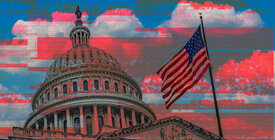Since 2020, the federal government, some social media platforms, election officials, and researchers have worked to address baseless claims of widespread election fraud. Project 2025, a plan to overhaul the executive branch under a conservative administration, aims to bolster election lies and hamstring the groups that counter them.
The plan, spearheaded by the Heritage Foundation, advocates for targeting tech companies, government officials, academic researchers, and civil society with retaliation for trying to address election misinformation. It also threatens to dismantle essential work by the Cybersecurity and Infrastructure Security Agency and the FBI in documenting and pushing back on false narratives about the election process and voting. If implemented, the agenda would be a boon to the Big Lie of a “stolen” election and foreign adversaries.
Project 2025 threatens social media companies that act to curb election falsehoods.
Project 2025 sends a clear message to social media companies: a conservative administration would punish them for limiting election falsehoods on their platforms. First, the plan calls for the Federal Communications Commission to work with Congress to weaponize antidiscrimination protections against companies that restrict or limit the visibility of user content that reflects “core political viewpoints” — which would likely encompass views that endorse election denial and related conspiracy theories, among other troubling narratives.
This initiative would almost certainly violate the First Amendment, as Project 2025 recommends an approach similar to a Texas law that was temporarily blocked by the Supreme Court. In a July ruling, a majority of the Court sharply criticized the law, which would prohibit social media platforms from removing content based on a user’s viewpoint. The Court signaled that the law likely infringed on platforms’ free speech rights and editorial discretion — at least as it applied to public posts on major platforms such as Facebook. Despite the legal frailty of Project 2025’s proposal for hampering content moderation, the goal is plain: frighten tech companies into submission by threatening frivolous enforcement actions and court battles.
Project 2025 also calls for the FCC to “eliminate” immunities that courts have read into Section 230 of the Communications Decency Act, which shields social media companies from civil lawsuits over user-generated content. This would mean that they could be sued for, among other things, removing election disinformation.
Project 2025 would supercharge attacks on researchers and civil society groups that study and flag election falsehoods.
Project 2025 calls for using the Justice Department’s powers to investigate and persecute perceived political enemies to a conservative administration. This would escalate the ongoing campaign against individuals and groups who have told the truth about the 2020 election, which has so far involved congressional subpoenas, lawsuits by state attorneys general, and private lawsuits by some of Project 2025’s authors. Deploying the Justice Department would further suppress researchers and civil society groups.
Those who seek to retell the story of the 2020 election have concocted a conspiracy theory about what they call the “censorship industrial complex,” which includes government agencies, academic researchers, and socially responsible private sector leaders who work to provide truthful information about elections and correct falsehoods. Turning the idea of pursuing the truth on its head, election deniers have claimed that these entities are engaged in a joint censorship effort.
Prominent election deniers have improperly used congressional committees to subpoena documents and interview researchers, including students and staff of the universities that employed them. America First Legal, a Trump-aligned group that was heavily involved in the creation of Project 2025, brought a lawsuit claiming that researchers violated the Civil Rights Act by studying misinformation in English and other languages and communicating their findings to the government. The claim preposterously describes the study of false election information’s impact on minority communities — and attempts to correct those falsehoods and mitigate the harm when discovered — as itself a violation of those communities’ First Amendment rights to view the falsehoods. Of course, the practice of ensuring that research properly accounts for diverse circumstances and communities is not discrimination; it is a safeguard against unintended bias.
In a worrying signal of potential future attacks on researchers and other groups, Project 2025’s authors repeatedly suggest that the Cybersecurity and Infrastructure Security Agency and the FBI’s disinformation work violates the First Amendment. This work includes the former flagging potentially false information on social media about when and how to vote and the latter assessing the impact of foreign influence operations on Americans. However, the Supreme Court recently dismissed Murthy v. Missouri, a case brought by state attorneys general that drew on this censorship conspiracy theory. The lawsuit paralleled America First Legal’s suits against researchers, claiming that the federal government was violating the First Amendment by communicating with researchers and social media companies to promote accurate election information and correct falsehoods.
Murthy resulted in an overbroad nationwide injunction issued by a district court judge that stopped this important work, even though the Supreme Court stayed the order pending its dismissal. The effort by state attorneys general previews the kinds of costly actions that a weaponized Justice Department might take against researchers and civil society groups, particularly given Project 2025’s plans to use the department to persecute political enemies.
Project 2025 would hamstring federal agencies that address election falsehoods.
Not satisfied with targeting private companies’ and researchers’ roles in curbing the spread of election lies, Project 2025 would also roll back the authority of the Cybersecurity and Infrastructure Security Agency, the main federal agency responsible for cooperating with election officials to keep elections secure and provide voters with accurate election information.
The agency maintains an Election Security Rumor v. Reality webpage and has forwarded third-party reports of election falsehoods to social media platforms. Project 2025 would strip these and other responsibilities, effectively ending the agency’s efforts to counter election falsehoods and severely limiting its ability to assist election offices, particularly in the crucial period leading up to elections when the agency’s work is most vital.
The plan would similarly impede the FBI’s vital role in documenting and countering efforts by state actors like Russia, China, North Korea, and Iran to manipulate or intimidate American voters, especially when they turn out to involve coordination or interplay between foreign and domestic actors. While Americans have the right to speak freely and even falsely in many situations if they wish, Project 2025 would go beyond protecting these rights. It would prohibit the FBI from conducting any “activities related to combatting the spread of so-called misinformation and disinformation by Americans” outside of criminal investigations. This would include assessments of the extent to which content originated from foreign states is reshared or adopted by American voters — a crucial component of the FBI’s mission to investigate foreign influence in U.S. elections.
• • •
Project 2025’s promised attack on those who dare to tell the truth about elections would be particularly destructive at a time when rampant false online information often outpaces local election officials’ ability to communicate the facts and when voters increasingly seek out election information on social media platforms. This danger is heightened for language-minority groups, who have fewer traditional news sources available to them.
Because the platforms lack the subject-matter expertise necessary to counter the onslaught of inaccurate election information, their staff turns to election officials and government agencies to help sort fact from fiction. Academic experts can identify emerging rumors before they take root, and federal agencies like the Cybersecurity and Infrastructure Security Agency and the FBI contribute critical updates containing nonclassified intelligence on foreign actors’ efforts to manipulate elections, as well as harmful narratives that spread domestically. Project 2025 threatens to derail the efforts to keep the public well-informed, particularly in the critical days and weeks leading up to elections.








